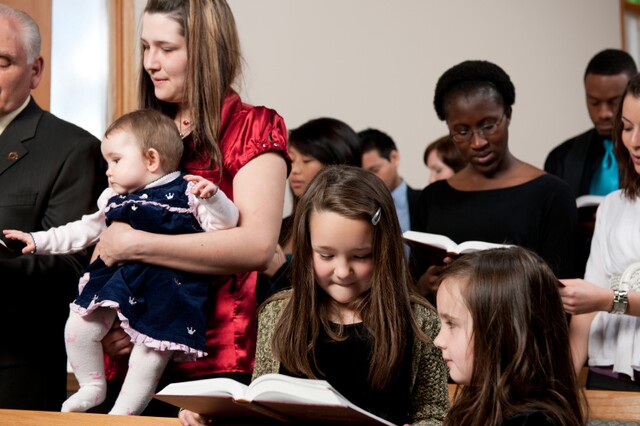Many Latter-day Saint families have a parent or spouse who is less-active or not a member of the Church. But that doesn’t mean we can’t find ways to love and include them in our own ward and family activities. Find out how you can better support those part-member families you know.
As members of the Church, we hold temple marriage as the ideal form of marriage, with both spouses attending church together. But this ideal is often far from the reality of what we experience in our wards and branches. Nevertheless, those with spouses who aren’t members of the Church still want to participate in and experience the blessings that come from living the gospel the best they can in their circumstances. And, like the rest of us, their best chance comes with love and care from their ward or branch family. Here are a few things we can do to support and strengthen the part-member families in our wards.
1. Accept and respect their family as it is.
Avoid making assumptions about why one spouse is a member and the other is not. Part-member families come into existence for all sorts of reasons. Our job is not to ask why they are the way they are, but to ask how we can love and support them. If tempted to judge their circumstances, choose to pray for them instead, asking how you can be of help to them. Then take action on the inspiration you receive. Let’s teach our children to do the same—to love all the families in our ward.
2. Be sensitive to their complex family situation.
In some part-member families, the nonmember spouse is very supportive, but in other cases, not so much. Lisa, a mother of three whose husband joined the Church before they married but stayed involved only briefly, says, “I don’t want to be treated any differently at church, but I need my leaders to be mindful of the complicated dynamics in our home. Things like home teaching and feeding the missionaries can be extra complicated. People want to set those things up with me, but I don’t speak for both of us.”
As we get to know the part-member families in our wards, let’s consider with compassion their circumstances and treat them as we would want to be treated.
3. Extend simple kindnesses.
When it comes to part-member families, the simple kindnesses can make all the difference.
Consider sitting next to a member whose spouse is absent at church. If you see a member struggling to handle their kids alone during sacrament meeting, offer to help—on more than one Sunday. When planning your next temple trip, carpool with someone who would otherwise attend alone. While such invitations may seem like a small thing to us, I can assure you that they make a world of difference for those we include.
4. Include them socially.
One sister, while her husband wasn’t interested in investigating the Church, wishes they had been included more socially with other members of their ward. Whatever family activities you enjoy, think about inviting a family that might not come to church together, but who would benefit from some fun with your family.
5. Focus on the positives.
Rather than focusing solely on the downsides a family may experience because not all are active members, choose to affirm them and celebrate with them all the wonderful things they have going on. Make a point of letting the parents know how touched you are by their commitment to their family. Let the good they are doing inspire you to action in your own family.
6. Respect how the nonmember spouse feels about church.
Elaine, who was married to a nonmember, says: “It’s great to include all whenever possible, but the nonmember should not feel that they’re a project that needs to be converted. By all means, if they ask questions, answer truthfully, but be sensitive to those who don’t want to know.”
Another sister said that as much as she loves the missionaries, she doesn’t want every new set that comes through their ward to challenge her husband to baptism, though she hopes he will someday be baptized.
7. Value the less-active or nonmember spouse.
Remember that they are a human being and a child of God.
Ruth, a mother of a 10-year-old, says, “My nonmember husband is the best dad ever! Don’t assume otherwise! Invite him to be involved. He can’t perform an ordinance, but he would be a great Scoutmaster. Since his abilities are often overlooked by Church members, we do our ‘extracurricular’ activities outside the Church. For example, about every six months he teaches some of the Cub Scouts in our PTA-chartered pack to fish; he is an excellent fisherman.”
Don’t assume that because someone is not a member of the Church that they don’t want to participate in some respects or aren’t interested in sharing their talents with the ward or branch.
8. Support the family’s spiritual growth.
Our church experience provides us with numerous opportunities to learn and grow spiritually together. Some of us have that same opportunity at home—to teach and share the gospel together. But for those whose spouse is not involved in the Church or perhaps not supportive of their spouse’s involvement, spiritual life can be very lonely from Monday through Saturday. While we cannot create that spiritual environment in another member’s home, we can still make a positive difference for them during the week.
Among other things, we can initiate a discussion with the member about a recent conference talk, share a favorite scripture (and ask them for theirs), or perhaps set a scripture study goal together. While such caring and engagement can be a blessing to them, it can also benefit us as they share their testimony and the spiritual insights they may not have the opportunity to share so openly at home.
9. Make a difference as a faithful teacher, home teacher, visiting teacher, or leader.
Part-member families benefit from our careful consideration as we seek to carry out the responsibilities of our church callings. As a teacher, keep part-member families’ circumstances in mind when prayerfully preparing and presenting lessons. Temple marriage can be a particularly sensitive topic. Seek for the Spirit to help you uplift and encourage every class member.
Visiting or home teachers have a unique opportunity to provide individual support at home. Home teachers can invite every member of the family to be present when they visit and share their message instead of assuming the nonmember doesn’t want to be included. And be sure to offer priesthood blessings to your part-member families as appropriate. Sisters, don’t miss the opportunity to share a spiritual message each time you go visiting teaching.
Leaders can provide part-member families with strong home and visiting teachers while being sensitive to family circumstances that might inhibit full participation in church activities or ordinances. And they can always invite members of the ward to accept, love, and serve one another regardless of differing family circumstances.
10. Ask how you can support their family.
Sometimes it’s appropriate to try to read between the lines about how we can support a part-member family. But sometimes it’s simply best to ask. Let the member know that you are mindful of their situation and earnest in your desire to support them. When they feel comfortable sharing their family’s needs, honor their trust by doing what you can to meet those needs.
11. Live the gospel.
Kim, a Latter-day Saint, says that the best thing we as Church members can do to support part-member families is to live our religion. She says this partly because her husband has watched members of the Church closely over the years and has been impressed with how they seek to live their beliefs.
If we as members of the Church are living our beliefs, we will refrain from judging other families’ situations and exercise compassion instead. If we live the gospel, we will bless their lives and, in turn, we will be blessed with friendships and experiences we would otherwise have missed out on.
12. Remember that consistency is key.
While occasionally making big efforts to support a part-member family can have a positive impact, the biggest difference is made by making consistent efforts over time. As individual members and families, you can prayerfully choose one or two part-member families to consistently reach out to and support. Start with an invitation to dinner or dessert. As you get to know these families, friendships will blossom and consistency will be easier because you will come to love them and naturally include them in your social circle. Be consistent in your show of love and you will make a positive and lasting difference for all.
Debra Sansing Woods is the author of Mothering with Spiritual Power: Book of Mormon Inspirations for Raising a Righteous Family, available at Deseret Book stores anddeseretbook.com. Read more from her at debrawoods.com.


